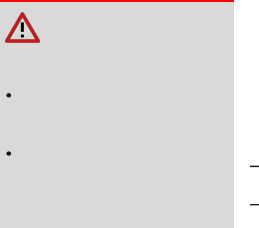Operating Instructions
Table Of Contents
- Table of Contents
- General instructions
- Overviews
- Displays
- Operation
- Ignition switch/steering lock
- Ignition with Keyless Ride
- Emergency-off switch
- Lighting
- Dynamic Traction Control (DTC)
- Electronic chassis and suspension adjustment (D-ESA)
- Riding mode
- Cruise control
- Distance control (ACC)
- Hill Start Control
- Anti-theft alarm system (DWA)
- Tire pressure control (RDC)
- Heating
- Storage compartment
- Central locking system
- Cases
- TFT display
- Audio system
- Setting
- Riding
- Technology in detail
- Maintenance
- Accessories
- Care
- Technical data
- Service
- Appendix
- Index

174 TECHNOLOGY IN DETAIL
the speed difference. The en-
gine control adapts the engine
torque when the slip limit is ex-
ceeded.
BMW Motorrad DTC is de-
signed as an assistance sys-
tem for the rider and for riding
on public roads. The extent to
which the rider affects DTC
control can be considerable
(weight shifts when cornering,
loose luggage on the motorcy-
cle), especially when approach-
ing the limits imposed by the
laws of physics.
The system is not optimized
for the special conditions
encountered under the extreme
conditions of competitive
off-road and racetrack use.
BMW Motorrad DTC can be
switched off in such instances.
WARNING
Risky riding style
Risk of accident despite DTC
The rider is always respon-
sible for adapting his/her
driving style.
Do not reduce the system's
extra safety margin with
careless riding or unneces-
sary risks.
Special situations
As lean angles increase, accel-
eration capability is also pro-
gressively restricted by the
laws of physics. This can result
in reduced acceleration when
coming out of very tight curves.
To detect spinning or slipping
away of the rear wheel, the
DTC compares the speeds of
the front and rear wheel and
takes the angle of inclination
and other factors into account.
If the values for the angle of
inclination are detected to be
implausible for a long period, a
substitute value is used for the
angle of inclination/the DTC
is turned off. In these cases, a
DTC error is displayed. A self-
diagnosis must be completed
before the fault memory entry
will be displayed.
Under the following un-
usual riding conditions, the
BMW Motorrad Traction
Control may be switched off
automatically.
Unusual riding conditions:
Riding on the rear wheel
(wheelie) for a longer period.
Rear wheel spinning in place
with front wheel brake en-
gaged (burn-out).










